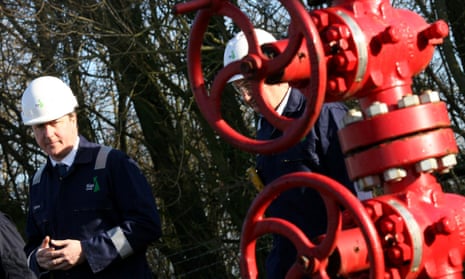Large areas of Yorkshire, the north-west and the east Midlands are to be opened up to fracking after the government announced it will offer a fresh round of licences for oil and gas exploration.
Areas near Leeds, Sheffield, Lincoln and Nottingham are to be offered to companies in an expansion plan that green groups predicted would trigger “hundreds of battles” over the future of the countryside.
Ineos, the Anglo-Swiss chemicals group that wants to lead the UK’s shale gas industry, was awarded three licences and said the latest ones could pave the way for gas to be pumped by 2020.
“If the planning system works as well as we hope, we should have meaningful production of shale gas in the UK by the end of the decade,” said Patrick Erwin, commercial director at Ineos.
The 2,700 sq km (1,040 sq miles) of land in 27 blocks of 10km x 10km will not be formally offered until a second much larger tranche, covering areas in the north-east, the West Country and the Isle of Wight believed to be ecologically sensitive, have been assessed under environmental measures.
The applications are subject to approval by local councils, which will have 16 weeks to decide on them. The government promised last week to step in if councils fail to keep to the deadline. The new guidance has given the secretary of state for communities, Greg Clark, the power to “call in” and fast track a ruling if deemed necessary.
Initial analysis by Greenpeace indicated the areas covered by the announcement will affect the constituencies of high-profile MPs including former Labour leader Ed Miliband, party leadership candidate Yvette Cooper, the education secretary, Nicky Morgan, and the shadow energy and climate minister Caroline Flint.
Daisy Sands, head of Greenpeace’s energy campaign, said: “This is the starting gun on the fight for the future of our countryside. Hundreds of battles will spring up to defend our rural landscapes from the pollution, noise and drilling rigs that come with fracking. It seems clear that the government is responding to the vigorous lobbying from the fracking companies by ignoring both the economic and environmental evidence that clean, renewable energy is a far better bet for investment and the planet.”
The government said a growing shale industry could create 64,000 jobs in the UK. The energy minister, Lord Bourne, said: “As part of our long-term plan to build a more resilient economy, create jobs and deliver secure energy supplies, we continue to back our onshore oil and gas industry and the safe development of shale gas in the UK. This is why the OGA [Oil and Gas Authority] has moved quickly to confirm the winners of licence blocks which do not need further environmental assessment.”
The government’s promise to fast-track shale gas in the UK comes on the back of a decision by Lancashire county council to reject an application by exploration firm Cuadrilla on the grounds of visual impact and noise. Both Scotland and Wales previously imposed moratoriums on fracking for shale gas. More than 170 oil and gas exploration licences have already been issued.
The move on Tuesday was welcomed by the oil and gas industry. Ken Cronin, the chief executive of UKOOG, the representative body for Britain’s onshore oil and gas industry, said: “The opportunity exists to create tens of thousands of jobs, reduce imports, generate significant tax revenue and support British manufacturing from an extremely small footprint which will benefit the environment at the same time.”
A source close to one of the UK fracking groups said recent government decisions would ensure that England moved ahead of Scotland in the race to frack, with the ruling SNP currently opposed to the industry.
Earlier this summer Jim Ratcliffe, the billionaire chief executive and founder of Ineos, claimed that the SNP was not against fracking despite the moratorium and said he could potentially see a commercial industry in Scotland by 2018.
Erwin said the latest move was positive, not just for Ineos but for the UK as a whole. He said: “It’s about saying that the UK is open for business and that there’s more to the UK than being just a service economy. We just can’t afford not to exploit shale gas. Gas will be a key enabler of lower carbon fuel.”
Asked what advice he would give to people living in areas earmarked for oil and gas exploration, Erwin said: “There’s a lot of information out there but often people are peddling ideas that are not true. People should look at the facts and make their own judgment.”
As the UK government looks likely continue on its promise to go “all out” for shale, the Obama administration in the US announced new measures to cut methane emissions from the oil and gas industry. The new standards proposed by the US Environmental Protection Agency follows a commitment by Barack Obama earlier in the year to reduce such emissions by 40-45% (on 2012 levels) by 2025 as part of a wider attempt to tackle climate change. Methane is the main component of natural gas. Although it remains in the atmosphere for less time than other greenhouse gases, it is understood to be many times more potent in terms of its impact on global warming.

Comments (…)
Sign in or create your Guardian account to join the discussion